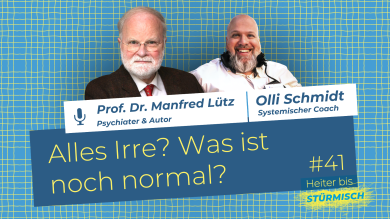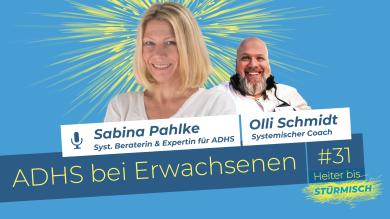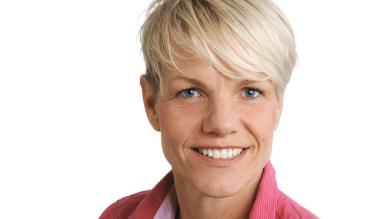
The imperfect employee - AD(H)S in adults
Adults with AD(H)S or ADD tick differently at work. Expert Sabina Pahlke shows what special features they have and how managers can provide them with the best possible support and promote their potential.
(Expert: Sabina Pahlke, systemic consultant, Editor: Gabriele Strasser)
Summary
ADHD* in adults often goes undiagnosed for a long time. Typical symptoms such as concentration problems, high distractibility, and pronounced creativity can present challenges, but also strengths in professional life. The key to success: choosing the right career, open communication, individual strategies, and professional support. Expert Sabina Pahlke and David M.'s experience report show how people with ADHD can best use their talents.
Read in this article
Show host Eckart von Hirschhausen inspires with his wit and temperament. What many people don't know: He has AD(H)S. In his original profession as a doctor, this was a problem. On stage, however, his creativity, flexibility and impulsiveness are the basis of his success.
For systemic consultant and AD(H)S expert Sabine Pahlke, this is a positive example: "But not all adults with AD(H)S find their niche in which their disposition is not a problem. Many don't know why they are often unfocused and unstructured or offend with their impulsive behavior".
Many adults with AD(H)S have been diagnosed late and have had to develop their own compensation strategies for a long time. Typical symptoms include a high level of distractibility, difficulties with routine tasks, but also creativity and a pronounced willingness to help.
While AD(H)S is often perceived as a problem in childhood, these characteristics can develop into strengths in adult life - provided that those affected find a suitable working environment.
Expert Sabina Pahlke recommends taking your own talents and needs into account when choosing a career. Hypoactive people (ADD) need clear structures, while hyperactive people (ADHD) prefer variety and creative tasks.
Open communication with managers and the use of coaches or therapists can help to find individual solutions and compensation strategies.
Always on reception: the brain does not filter
David M. has AD(H)S. He sums up what is special about it: "What is normally filtered by the brain, I get unfiltered. For example, when I'm sitting in a café, I find it very difficult to have a conversation with the person opposite me. I can hear everything that's going on around me: cars driving past, conversations with other customers, the clatter of dishes, music."
Very few adults over the age of 40 were diagnosed as children. This was also the case for David M. The now 40-year-old IT system administrator already suspected that he was different when he was at school. "You have the music you last heard in your head all day long. You tap along to the beat of a song - and of course disrupt the lessons". But he didn't just have bad grades, he also had A grades. "Some teachers and content had the power to grab me. Maybe physics kept me busy all day, but Latin was off the agenda".
David M. didn't find a good doctor who diagnosed him with AD(H)S until he was in his early 30s. "It was a huge relief for me to be heard and to know exactly what was different about me," he says.
This letscast.fm content can only be loaded if you accept the privacy policy of letscast.fm.
To the data protection settings "
This letscast.fm content can only be loaded if you accept the privacy policy of letscast.fm.
To the data protection settings "AD(H)S does not grow out of control
Most people think of children when they think of AD(H)S. For a long time, the doctrine was that the disorder would fade away in adulthood. However, according to the website of the ADHD Deutschland e.V . association, recent studies show that 30 to 50 percent of affected children also show symptoms in adulthood that significantly affect their lives.
"Adults with undiagnosed AD(H)S have often painfully learned to deal with the symptoms and have developed compensation strategies for everyday life," says Sabina Pahlke. In the meantime, it has also been discovered that undiagnosed AD(H)S often leads to serious problems. For example Burnout patients often have previously untreated AD(H)S.
In the right place with your own talents
Employees with ADHD
If the disposition is known, Sabina Pahlke advises taking it into account when choosing a career: "Adults with AD(H)S can hardly stand boredom and avoid anything repetitive and unstimulating. Organizing themselves takes a lot of energy. It is worth taking a close look at your own talents and skills and considering which professions and industries are most likely to be in demand. This can reduce the number of unloved tasks".
Listen to our podcast "Does my child have ADHD?" with Sabina Pahlke.
Employees with ADHD
Hypoactive people, i.e. people with ADHD, are less noticeable: "They tend to make an unmotivated and often tired impression. Clear structures, delineated task packages and assignments and an attentive and supportive environment can help in everyday working life. They are also creative, but more inward-looking," says Sabina Pahlke.
David M. can confirm this: "I have to concentrate very hard on completing my tasks, not forgetting anything and not getting distracted. In an IT job, you constantly have the internet in front of you. Not drifting off here is a big challenge. Paradoxically, I always look for jobs with as many projects and areas of responsibility as possible to avoid long periods of monotonous work.
People with AD(H)S also have great potential off the stage, as in the example mentioned at the beginning. "They often score particularly well with their creativity. They also like to be there for others and are extremely helpful," says Sabina Pahlke. David M. also has strengths that put him in exactly the right place in his job as a system administrator: "I miss very little because I grasp all aspects unfiltered. That's why I'm very good at error analysis, for example. And my attentiveness and curiosity help me in my dealings with colleagues and customers.
From a shortcoming for children to a plus for adults
In people with AD(H)S, the symptoms often change as they develop from a child into an adult. What is perceived as very stressful in children can then become a strength. Sabina Pahlke knows examples: "Stubbornness sometimes grows into amazing perseverance. If something is important, you stick with it. The willingness to discuss, which is often unpopular with parents, promotes language skills and often turns into a strength in adulthood. The urge to talk and "produce" has brought many a person onto the stage.
Good treatment and support possible
"Adult sufferers can also be treated and supported well," says Sabina Pahlke. "A coach or therapist who is familiar with the symptoms can develop compensation strategies with those affected , work out a structure and support them in their search for further help. Depending on the severity of the symptoms, there are good alternative treatment options, including traditional medication. The first step, however, is self-awareness and subsequent disclosure in the immediate environment.
David M. has decided against medication: "Although tablets help, they force me to tick differently. After a day at work with tablets, I'm very exhausted and feel like all my energy for the day has been squeezed out of me," he says. The side effects of the medication, such as loss of appetite and numbness, also hinder his private life. "The tablets help me to function. That may be good for a day at work or a long car journey, but not for a successful evening with my child," says David M. He has decided to be who he is: "The best thing is to allow myself periods of rest and to surround myself with people who accept me and are happy to help me.
Managers can be contact persons
For Sabina Pahlke, in addition to therapists and topic-specific coaches, managers can also support those affected, provided they are open about their symptoms. "Together, employees and managers can identify a suitable area of responsibility based on strengths and weaknesses. They can also make specific agreements if the employee displays unhelpful behavior. Based on their own observations alone, the manager may get the impression that the employee is demotivated or lacks motivation. Here, specific questions help to get to the bottom of the issue.
According to Sabina Pahlke, seminars that focus on the people behind the work force and offers for mental and physical health are also helpful.
David M. has not yet revealed himself to his employer, but says: "If I were to inform my employer, I would want to be judged on my work like everyone else and be given the tasks for which I was hired - and for my manager to talk to me if she is not satisfied with my work".
What is AD(H)S and how does it manifest itself in adults?
AD(H)S stands for attention deficit/hyperactivity disorder. Adults often experience concentration problems, impulsiveness, organizational difficulties, but also particular creativity and helpfulness.
Why is AD(H)S often recognized late in adults?
Many sufferers only receive a diagnosis in adulthood because the disorder was previously only suspected in children. Adults often develop their own strategies to deal with the symptoms.
What strengths do people with AD(H)S have at work?
Shey are often very creative, flexible, helpful and can flourish in a variety of tasks. Their ability to perceive many impressions at the same time makes them strong in error analysis or in dealing with people, for example.
What challenges do working people with AD(H)S face?
Routine tasks, monotonous activities and a lack of structure can be stressful. Distractibility and organizational problems often lead to misunderstandings with colleagues or managers.
How can managers and companies provide support?
Through open communication, individual distribution of tasks, clear structures and, if necessary, external support (coach, therapist). It is important to recognize strengths and make targeted use of them.
Is medication necessary for AD(H)S?
Medication can be very helpful, but is not suitable for everyone. Many sufferers prefer alternative strategies such as coaching, structural support and consciously choosing their working environment.
What helps AD(H)S sufferers in everyday life?
Compensation strategies, rest breaks, a supportive social environment and acceptance of one's own particularities are key. Openness towards the employer can be helpful, but is an individual decision.
Sources: ADHS Deutschland e.V.




.jpg/2efeaa7b-f1ec-1ca9-9c55-3f523106067d/2efeaa7b-f1ec-1ca9-9c55-3f523106067d?imageThumbnail=2)




 (1).png/4c710762-3137-efdf-a95a-1ef231de5907/4c710762-3137-efdf-a95a-1ef231de5907?imageThumbnail=2)

